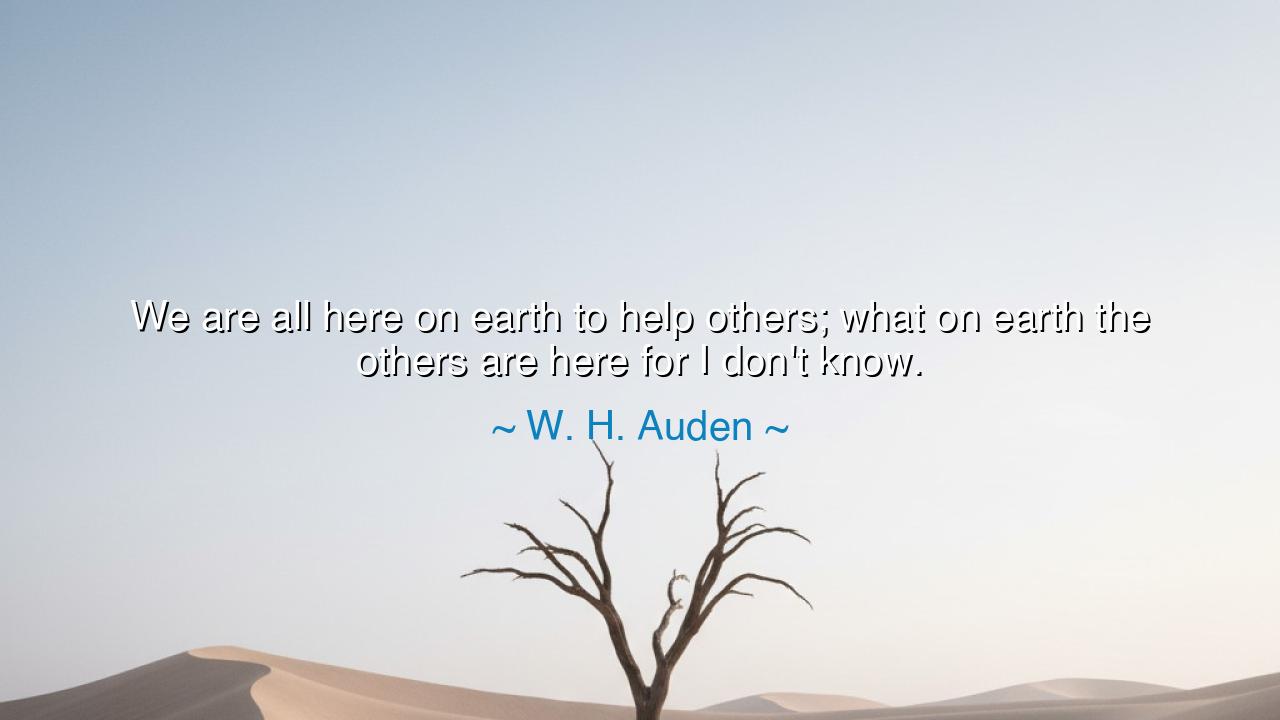
We are all here on earth to help others; what on earth the others
We are all here on earth to help others; what on earth the others are here for I don't know.






In the grand sweep of existence, there is a question that haunts the minds of many: what is our purpose? Why are we here, in this vast, ever-turning world? The words of W. H. Auden echo through time, offering us a glimpse into the deeper mysteries of life: "We are all here on earth to help others; what on earth the others are here for I don't know." These words, both humorous and poignant, cut to the heart of a truth that lies at the core of our human experience. We are born into a world that is, at its essence, a tapestry of interwoven lives—each one affecting the other. Yet, Auden’s reflection reminds us of the peculiar nature of this existence, where the act of helping and serving others seems to be the only constant.
In the teachings of the ancient philosophers, such as Aristotle, we find an echo of this sentiment. Aristotle believed that human beings were social creatures, destined to live in communities and to seek the good of others. His notion of eudaimonia, or the pursuit of flourishing, was rooted in the idea that true happiness arises not from selfish pursuit, but from the cultivation of virtue and the service of others. The Stoics, too, held that the highest good was found in contributing to the greater good, in aligning oneself with nature’s will and aiding fellow beings. In this way, the notion of helping others as our true purpose is not a modern invention, but a timeless truth passed down from the ancients.
But while the act of helping is a noble pursuit, Auden’s words also point to a deeper mystery—the role of those we help. If we are born to serve, what of those who receive our service? Are they equally bound by this duty, or is there something more enigmatic at play? Perhaps Auden is asking us to reflect on the paradox of human existence: we live in a world where every individual is born to serve, yet no one seems to have a clear understanding of why others exist to receive this service. It is a question that lingers like a shadow, reminding us that the answer to life’s purpose is not easily found.
Consider, for example, the life of Mahatma Gandhi, who devoted his entire existence to the service of others. He gave up his personal comforts, his desires, and his ambitions to work toward the liberation and equality of his fellow countrymen. His life was a testament to the idea that we are here to help each other, to lift one another from the burdens of oppression and injustice. Yet, even Gandhi himself, in moments of reflection, questioned the nature of his own sacrifices. He often wondered about the true cost of his dedication and what, in turn, those who benefited from his work were meant to learn from it. Was it merely to continue the cycle of helping, or was there a deeper lesson that all of humanity must grasp?
In ancient stories, we often encounter heroes who are called to serve, whose purpose is to help others, only to realize that the help they offer is part of a larger, more mysterious journey. Hercules, the great hero of Greek myth, completed his twelve labors, each one more difficult than the last, all in service of others. But his journey was not just about the fulfillment of others’ needs—it was a path of self-discovery, a confrontation with his own fears and weaknesses. Similarly, Auden’s quote invites us to consider that in helping others, we too are shaped and transformed. We may not fully understand the purpose of the others in our lives, but their existence pushes us to become better, more compassionate beings.
The lesson of Auden’s words, then, is both humbling and empowering. It reminds us that the purpose of our lives is tied to the lives of others. We are not solitary creatures, but part of a greater whole, where our actions ripple out and touch the lives of countless others. Yet, in helping others, we must also reflect on the nature of our own service. Are we truly giving selflessly, or are we seeking recognition, comfort, or some other form of reward? And what of those whom we help? In their lives, do they see the gift we offer, or are they merely recipients of our efforts? The balance between giving and receiving is a delicate one, and it is this tension that shapes the human experience.
In practical terms, Auden’s reflection calls us to action. It urges us to engage in the world with a sense of purpose, to serve others not for the sake of recognition, but because it is through service that we discover our own true nature. Whether it is in our families, our communities, or the world at large, we must strive to give freely of ourselves, knowing that in doing so, we are fulfilling our highest calling. And yet, we must also recognize that the question of purpose is ever-present, a riddle we may never fully solve. In the end, perhaps the true purpose of life is not to understand all the answers, but to live with the awareness that our actions, both big and small, have meaning beyond our comprehension. Help others, and in doing so, discover the mystery of your own existence.






AAdministratorAdministrator
Welcome, honored guests. Please leave a comment, we will respond soon